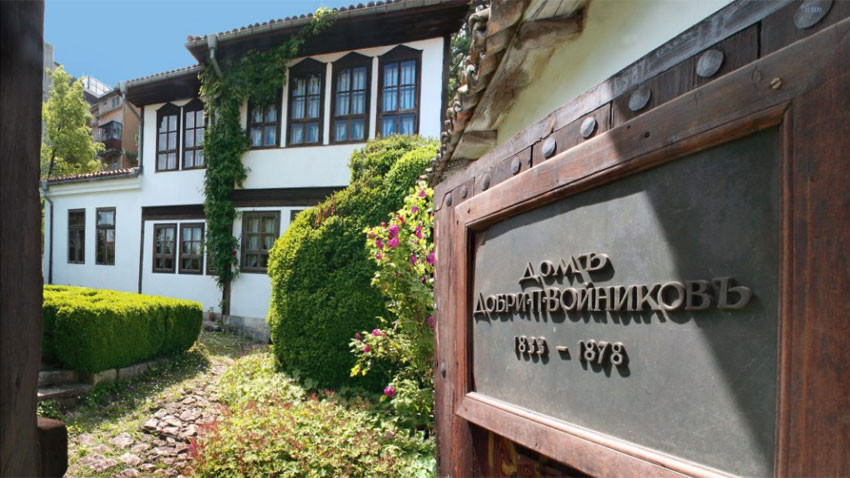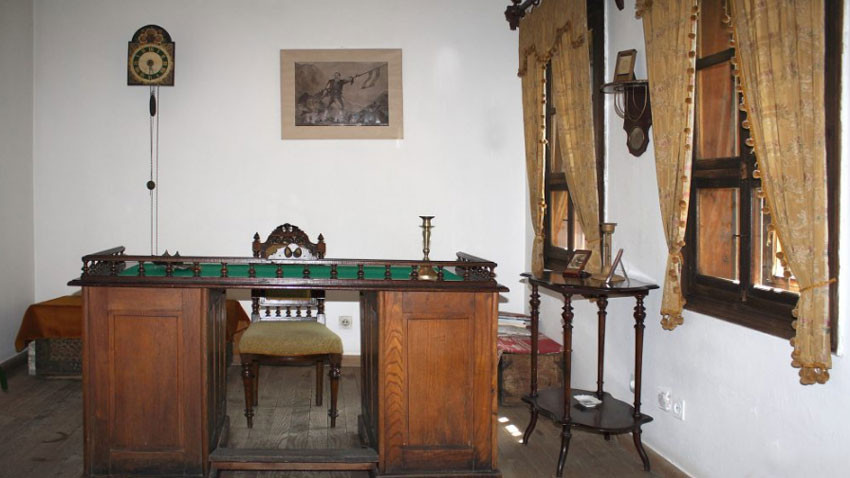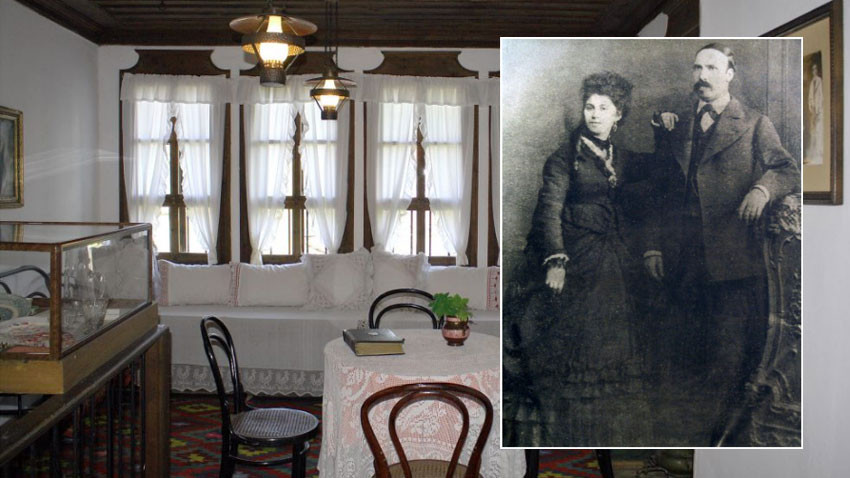
The house museum of Dobri Voynikov is nestled in the heart of the city of Shumen (Southwest Bulgaria) which is a home town of many renowned Bulgarians who contributed to the development of the city as a spiritual, political and economic center during the Bulgarian National Revival. A letter of Hadji Minasa Puzhushyan which was part of his travel notes Trip to Poland and Other Places, published in Venice in 1830 reveals an interesting fact. The Armenian traveler describes in this letter a music and theatre performance dedicated to St.St. Cyril and Methodius. The evening performance was held at the local theatre hall in Shumen by three men, which according to the author was something usual and traditional. This was the first preserved document of such civil celebrations in Bulgaria. One of the first Bulgarian community centers was also established in the city of Shumen in 1856. Some of Bulgaria’s first theatre performances and city orchestras were also launched there. A number of cultural events held for the first time in Bulgaria were written in the history of this Bulgarian city. Many of them are associated with the name of Dobri Voynikov. The museum exhibition in Dobri Voynikov’s home keeps documents, manuscripts, theatre costumes and other items linked with his activity. Krasimira Chalakova who is a curator of Dobri Voynikov’s house museum told Radio Bulgaria details about his deed:

 Dobri Voykikov was an educationalist above all. He was a teacher and being such he introduced the linear notation and established the European style of teaching. He wrote some of the first Bulgarian history and grammar textbooks. Dobri Voynikov was not a fan of the mentorship methods that were so popular at that time and held a series of interesting discussions oriented towards the interests of the Bulgarian pupils instead. Thus, he literally captivated his students with his subjects. Dobri Voynikov became an acclaimed musician when he was still a high school student. He is among the first members of the first Bulgarian orchestra composed of Hungarian and Polish emigres established in Shumen by conductor Mihai Shafran in 1850. When Mr Shafran left Shumen he gave his baton to Dobri Voynikov who became the first Bulgarian to conduct such an orchestra. Later, Voynikov broadened his horizon. He used theatre and music to awaken the national consciousness.
Dobri Voykikov was an educationalist above all. He was a teacher and being such he introduced the linear notation and established the European style of teaching. He wrote some of the first Bulgarian history and grammar textbooks. Dobri Voynikov was not a fan of the mentorship methods that were so popular at that time and held a series of interesting discussions oriented towards the interests of the Bulgarian pupils instead. Thus, he literally captivated his students with his subjects. Dobri Voynikov became an acclaimed musician when he was still a high school student. He is among the first members of the first Bulgarian orchestra composed of Hungarian and Polish emigres established in Shumen by conductor Mihai Shafran in 1850. When Mr Shafran left Shumen he gave his baton to Dobri Voynikov who became the first Bulgarian to conduct such an orchestra. Later, Voynikov broadened his horizon. He used theatre and music to awaken the national consciousness.

In 1864 Dobri Voynikov departed to Brăila, Romania and founded a Bulgarian amateur theatrical company. He played there the first historical Bulgarian dramas he wrote earlier. Many Bulgarian revolutionaries and intellectuals joined Voynikov in Romania. Hristo Botev became one of the actors in his theatrical company. For the first time in the history of Bulgarian theater women took part as actresses. In the bosom of art, culture and pedagogy Dobri Voynikov worked for Bulgaria’s liberation without the use of weapons and without bloodshed. He helped many Bulgarians realize their national identity. The popular Bulgarian voivodes Hadzhi Dimitar and Stefan Karadzha also took part in his performances. That is why some of Dobri Voynikov’s songs sounded during battles. The Bulgarian exiles actually carried the fight for liberation on their shoulders, but they were strongly supported by figures such as Dobri Voynikov.

In 1875 Voynikov returned to his home town of Shumen. He revived the local theatrical activitiy, Krasimira Chalakova went on to say. His wife was the first woman who dared taking part at theatrical play in Bulgaria. The Misunderstood Civilization is his most popular play and is still part of the programme of the Bulgarian theatres.

Dobri Voynikov was a very humble person and viewed his pieces as student works. The contemporary scientists also find some imperfections in his works, but one thing is for sure-Voynikov made a real cultural revolution. He wrote folklore music and students’ songs. Dobri Voynikov introduced for the first time the polyphonic singing in school and founded the first polyphonic student choir. He realized the huge power of art and believed that music and theatre carry a common message. Dobri Voynikov was an author, scenographer, playwright and actor. His pieces sound during the theatre plays and the intervals. Dobri Voynikov teaches us to be good people and neighbors, to be modest and love our fatherland and always return to it.
English version: Kostadin Atanasov
Photos: museum-shumen.euFor the first time, two of the most mysterious archaeological sites in the Eastern Rhodopes have been studied in detail from air. Bulgarian archaeologists scanned the Harman Kaya rock complex near the village of Bivolyane and the ancient Asara fortress..
After the Liberation in 1878, Bulgaria began to develop at a pace that would make up for the centuries-long absence from the world history map. Young Bulgarians graduated from prestigious European universities and took their knowledge to their homeland..
One of the three biggest Hebrew holidays, Pesach (Passover) starts at sundown (5 PM) on 22 April and ends on 30 April. It is a movable feast, falling after the 14 th day of the spring month of Nisan which starts after the spring equinox with the..
For the first time, two of the most mysterious archaeological sites in the Eastern Rhodopes have been studied in detail from air. Bulgarian archaeologists..

+359 2 9336 661
